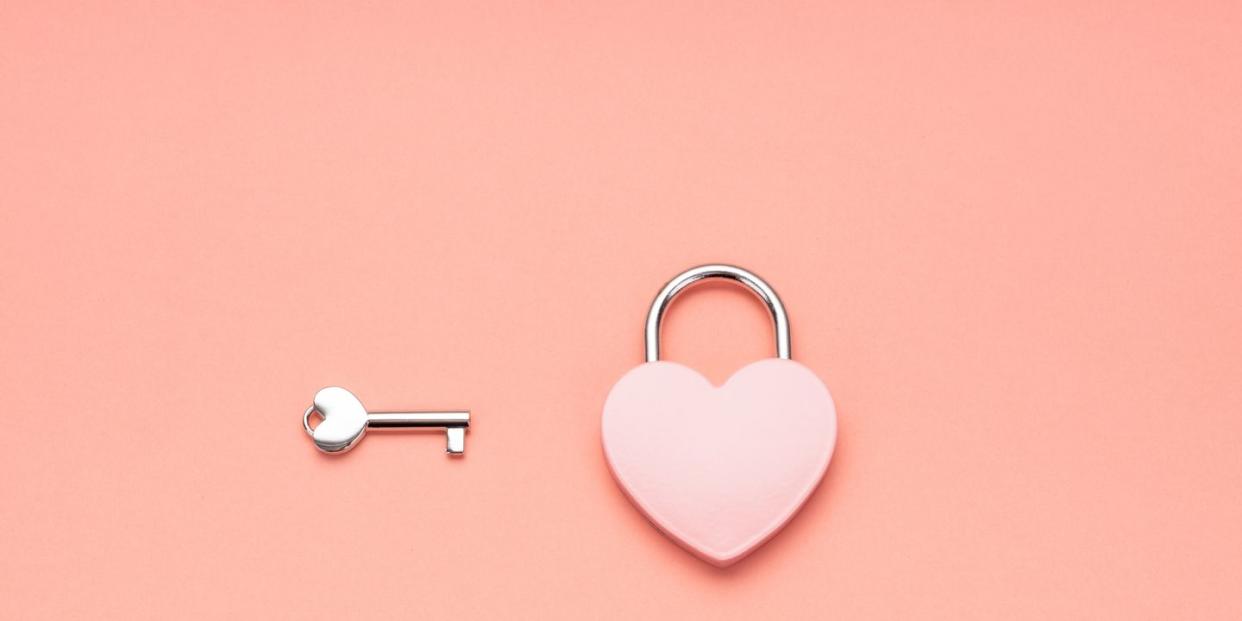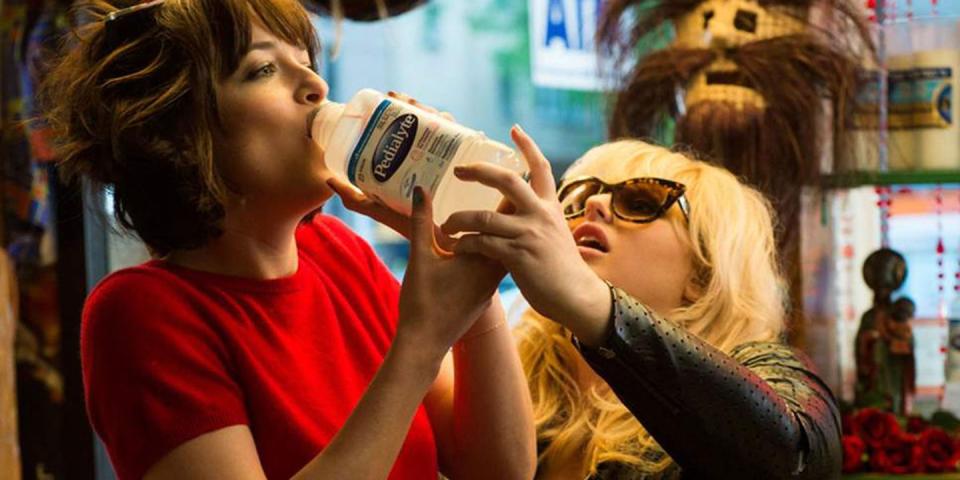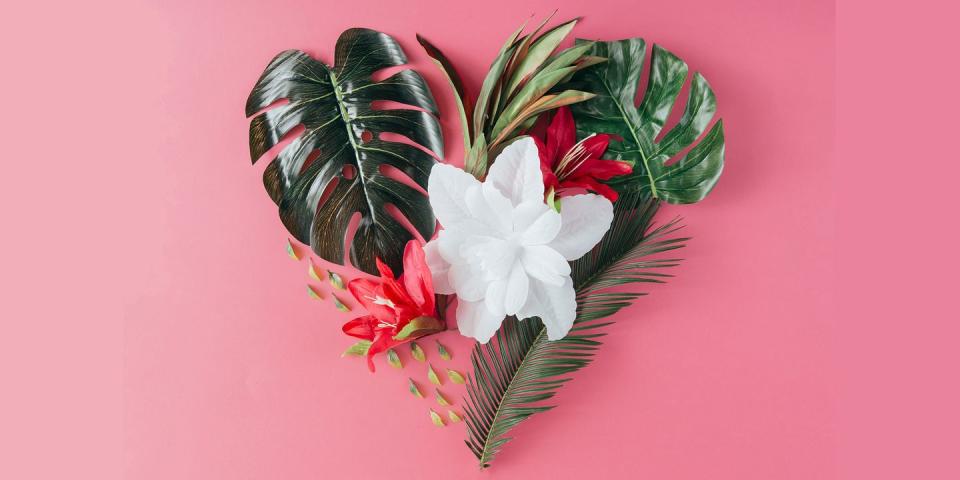Are you scared to call someone your "boyfriend"?

I was single for three years before meeting my now-boyfriend, Ben. We clicked straight away (he lasted as my housemate for all of two weeks before we hooked up) but even though I was super happy I’d found someone fit, intelligent and who made me laugh so much my stomach hurt, in the beginning, it was still a challenge saying the word “boyfriend”. It’s not the first time I’ve had that issue either…
Why? Well, I think my fear of using the B-word possibly stemmed from the idea that my friends would suddenly think of me as boring, stop inviting me out, or see me differently because I was in a relationship. Saying "Yes!" to every invite and being on hand to chat up guys in the smoking area on a night out - essentially, being one of the "fun ones" - had become a major part of my identity. A part that I was afraid of losing.
In a way, I also felt a weird sense of sadness over the end of my single life too. After three years of playing the field, I’d gotten so comfortable being ‘that friend with the hilarious dating stories’, I even wrote about them on a regular basis as part of my job at Cosmopolitan (see: the time I tried dating an actual prince or only men named Daniel for details). It was a big change suddenly having a partner and I worried friends might be disappointed not hearing those tales anymore – there's also a special type of bond that forms between two single women through having that shared experience. You become support systems for one another, slag off happy couples together on hungover Sunday afternoons. I desperately didn't want to not feel as close to my single pals any more because we didn't have that to bond over, now that I was on the other team.

But were those wobbly feelings about losing my identity as a single woman normal? Were they a sign that perhaps I wasn’t in the right relationship after all? And how about that deep-rooted worry that all my friends would turn around and shout “YOU’RE DULL NOW!” at me over brunch or pre-drinks?
A fear of commitment?
According to Simone Bose, a therapist from Relate (the relationship counselling charity), those feelings were all fairly normal. “In the counselling room, I’ve seen lots of people entering into a new relationship who worry about how to juggle their time.” The key thing, she pressed, was ensuring you still prioritise your own hobbies, interests and seeing your friends – if that’s something extremely important to you (which to me, an only child who sees friends as family, it definitely is).
Simone also mentioned not letting other things, such as fitness, slip, if they add value to your life, when you get a partner. For me, however, I didn’t feel like the problem was finding the time for my friends, but rather the opposite: how could I prioritise my boyfriend? That one needed a deeper dive to untangle.
Some of my closest friendships were built on analysing Bumble conversation screengrabs via WhatsApp and going on nights out hoping to pull – I worried that having a proper boyfriend would change how those people saw me. “Good friends will stick around. Do you really want friends who are only surface level?” asked Simone, before suggesting that actually, the problem wasn’t with my relationship at all, but rather an issue with my own self-acceptance (deep, man). “If you’re questioning ‘Who am I?’ when you’re not telling those quirky dating stories, or playing that Bridget Jones-type character, then it’s more than likely the issue is self-acceptance and about you learning to like yourself for who you are.”
Essentially, being in a relationship shouldn’t mean that you don’t have a fun personality anymore; it simply means that you’re someone with a fun personality who is in a relationship now.
What does boring even mean, anyway?
When recounting this fear of being viewed as “boring”, Simone also challenged me on what the word actually meant to me. At first, I couldn’t answer. Was it just that I was quite into having a bit of party girl image (which maybe I never even had in the first place, although I did once work in a strip club and date a man with a tattoo of a sword on his face)? That I worried I wasn’t fun to be around?
“It’s a narrative you’ve got from somewhere, a social construct you’ve come up with, which isn’t the real story,” said Simone, as I awkwardly wriggled in my seat. “Question where you got that story from. Is it something you’ve read in a book, is it the narrative that circles within your friendship group?” The more I broke it down, the more stupid it seemed that I’d been afraid of being described as “boring for having a boyfriend” when I couldn’t even really pinpoint what “boring” meant. Might it possibly be from witnessing friends disappearing in the past when they’d got a long-term partner, and writing them off myself?
Simone also made the very valid point that not all friends are meant to be there throughout every stage of your life either and that by in leaning into fear, you’re at risk of missing out on the good parts of an exciting new life stage: your relationship. “It’s not only people getting into new relationships that can feel this way either, there are lots of other big life changes, the biggest one probably being having a child, which can make you feel like your identity is changing.”

Identity crisis
After ending my unexpectedly thorough counselling session (I thought we’d have a five-minute chat wherein Simone would literally be like, “You’re fine, everyone feels like this. Bye!”), I thought more about what she said. I wrote a list of the core things I associated with being myself (this sounds wanky and weird and self-indulgent) – both good and bad. I realised nothing on the list, which included things like "empathetic", "ambitious" and somewhat ironically, "prone to overthinking", had changed since I got together with Ben. I also messaged a few pals asking how they’d describe me using three words (this is the beauty of journalism – you can ask questions like that under the guise of research). I asked them to be brutally honest and the answers ranged from “fun, loyal and driven” to “witty, considerate and reliable” (naturally upon hearing “reliable” my brain started shrieking “UNINTERESTING! DRY! SHE THINKS YOU’RE A HUMAN RYVITA!”, so yeah, still gonna need to do a bit more work on that one). None of them, however, replied with “boring and unavailable now that you have a partner”. Thinking about it further, if anybody had have said that, I’d have just archived them anyway.

The lightbulb moment
Another key chunk of advice that Simone left me with? Don't forget your partner is meant to be one of your best friends too, so treat them accordingly. In the past, I’ve gone so far the other way, when trying to prove that I wasn’t someone who became all-consumed by my relationship, that I was actually a pretty crappy girlfriend (see: immediately cancelling on long-term dinner plans with my ex-boyfriend Matt* if a spontaneous night out with the girls came up instead).
“If that’s the case, you need to ask yourself if you’re really ready for a relationship,” said Simone. “It could also be that your defences are coming up. Maybe you feel vulnerable because past relationships became too deep and didn’t end well.” With Matt, looking back, I can see I probably wasn’t ready for anything serious, or as harsh as it sounds, just wasn’t that into him. And prior to Matt, yep, I’d absolutely fallen head first into all-consuming relationships, then lost friends and confidence when they ended. Ah, a lightbulb moment, if ever there was one. I also realised that there are plenty of other things I'd rather be known for, besides being a party girl. Like being kind, hard-working and creative, for starters.
“When in a relationship, you need to strike a healthy balance between being together and being apart,” Simone confirmed. “Being too enmeshed or too distant can ruin a relationship. If you neglect it, then it will break down.” This time around I am ready – and happy – to have a partner. Ben and I have been together for 18 months now, and I’ve made a hard rule that whatever I’ve written in my diary first, stays in my diary. Whether that’s dinner with him or drinks with the girls. As for the self-acceptance side of things, well… surely that’s a work in progress for all of us?
Follow Jennifer on Instagram or Twitter
You Might Also Like

